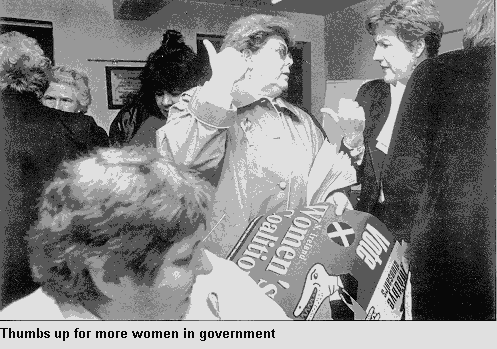The so called ‘trickle down’ effect is one of the most hallowed ideas projected onto social justice issues. But it’s also one of the most flawed.
Women in Northern Ireland have been told for years to bide our time and wait for gender equality to trickle down. Female representation at Stormont and Westminster has been dire for decades, but, so goes the myth, there’s nothing we can do about it except sit and wait for the tide to turn naturally.
Yet, here we are in 2015 little better off than our mothers and grandmothers.
The list of politicians battling it out for the Northern Irish seats in the Westminster election were revealed yesterday. The DUP isn’t running a single female candidate, it is fielding 16 men for 16 seats. In total, across all parties just 24.6% of the Northern Irish candidates are female.
At the last election, when Naomi Long sensationally swept to victory at Peter Robinson’s expense in South Belfast, we had the biggest ever number of female Northern Irish MPs- 22%. An improvement, but hardly a revolution.
Yet, this year, it looks like we could actually see a reduction in the already meek female representation. Naomi Long’s East Belfast seat is facing serious challenge from the unionist unity candidate and Michelle Gildernew’s Fermanagh and South Tyrone seat hangs by a knife edge.
The combination of reigning female MPs facing serious challenges to their seats, mixed with the paltry offering of female candidates in other seats, means that we’re facing the very real possibility that we’ll see even fewer Northern Irish women in the House of Commons come May.
The ‘trickle down’ effect for female representation in Northern Ireland’s political landscape has dried up to a paltry dribble. And it’s not enough.
Nowhere near enough is being done to increase women’s participation in political life in Northern Ireland. The DUP’s decision to not run any female candidates in the election is a two fingered salute to its electorate.
The other parties’ paltry 24% amounts to nothing more than an indifferent shrug in female voters’ directions.
So, my challenge to women in Northern Ireland is this- isn’t it time we set up our own women’s political party?
Some of you might remember the Northern Ireland’s Women Coalition of the nineties. It was a passionate, but short lived experiment which saw the party elect two MLAs to the fledgling Northern Ireland Assembly of 1998.
Whilst it garnered some interest at the time, it was generally agreed that Northern Irish politics had bigger fish to fry in 1998, and was soon left by the wayside as the peace process was forged.
That was 17 years ago, and Northern Irish women are still side-lined by the male, middle aged behemoths at Stormont and Westminster.
Given the recent re-emergence of main stream feminism around the world, and ongoing local debates about abortion rights and legislation of prostitution in Northern Ireland, now could be the perfect time for a revival of a party like the Northern Ireland Women’s Coalition.
Women in Northern Ireland have been politely waiting for the main parties to start taking us seriously for far too long. Yesterday’s release of the election candidates shows that progress is stalling. Perhaps it’s time for Northern Irish women to take matters into their own hands and demand equal representation in parliament rather than accept our local parties’ paltry offerings.
Siobhan Fenton is an election reporter at The Independent.
[twitter_follow username=”https://twitter.com/siobhanfenton” language=”en”]
Discover more from Slugger O'Toole
Subscribe to get the latest posts to your email.
